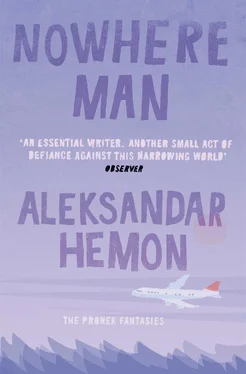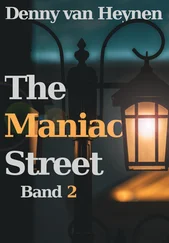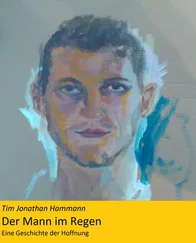My father rendered his pre-American days in disconnected details: how during wartime they all shared cigarettes when they had them, and smoked lint from their pockets when they didn’t; how he was the handsomest, most sonorous singer in Lvov; how the POWs wept when he sang “Ukraine Hasn’t Died Yet”; how he and his best friend embraced in the snow, warming each other up with their breaths, until his best friend’s breathing ceased; how he had sung opera only once, in Kitchener, Canada, in the role of Wotan, terribly miscast in a local production of Die Walküre. Sometimes, at home, he would break out into the Magic Fire Song, which always scared the crap out of me.
Boy, was I on a roll, I kept babbling — it is very possible that Jozef did not understand most of my prolix monologue. As a matter of fact, out of the blue sky, so I was a little irked, he said:
“You know, Bandera, when he was young, he wanted to be strong, to not feel pain. So he put his finger in door and then close door so he can see how long can he feel pain. He has did that every day.”
What could I say? I said: “That’s crazy.”
Anyway, after the demise of the Opera Society, my father drove a truck — my mother told me once that one of the things he had transported was foreigners across the border. He drove his truck to the US and he met my mother in Chicago. My mother was a South Side Irish girl, nineteen at the time. He knocked her up, possibly deliberately, in order to get American citizenship (my mother screamed out that secret in the middle of one of their more destructive fights). In any case, he married her, maybe for his sense of manly duty, maybe for the passport — I did doubt it had been love, for love was hard to come across in my father’s words and deeds. He was, I attested, an unaccommodated man.
“It’s like American novel,” Jozef said.
“Yeah,” I said.
But that could be because my older brother, born a few months after they had got married, was killed in Vietnam (“Vietnam — big war,” Jozef said). I remembered him as this remote uniformed presence, someone who had thrown a baseball at me not trying to hit me in the nose. Here on my desk (Please, take a look!) I have a picture of him in his uniform, smiling, with a baseball mitt, yawning like a carnivorous plant, on his left hand. My brother was blown to pieces by a land mine. Years later, we received a visit from his army buddy, who was now peddling booze money in exchange for the true story, and who in pathologically gory detail described my brother’s death: spilled guts still throbbing in the dirt, ungodly howling, a Charlie sniper shooting off his knees, etc. My mom blamed my dad for her son’s death, she blamed all his fallacious army stories, all that sleeping-in-the-woods bullshit that deluded my brother into thinking that the army built a man’s character — it kills the body, she wailed, screw the character, my son’s body is gone. My father thought that every man needed character — that a life that produced pain built your character the way that door built Bandera’s. So my brother’s absence, the paint of his death on the walls of our home, that had built my character. My father, nunckle motherfucker, never talked about it, just went to the Chicago Avenue church, sang in the choir, his jaw eternally clenched. My brother was killed a week before he was to be discharged. He was twenty-three, his name was Roman.
“Very interesting,” Jozef said. “Roman means novel in my language.”
“Oh, fuck you,” I said, and that was the first time I got mad at him. But it didn’t last long: we sat on the bus next to each other again, in silence, and I was just about to tell him I was sorry, when I realized he was asleep, the wanton boy, his head on my shoulder, his saliva dribbling on my sleeve out of the corner of his mouth, my hand levitating above his nape, a touch away from his gentle neck.
Returning to Kiev a couple of days later was like coming home: the smell of socialist grease and vinegar was as familiar as my mother’s kitchen; in the humble room, a pair of silk socks I had taken off upon my arrival waited crumpled under my bed. Jozef dropped his bag, leapt out of his shoes, and threw himself on the bed, its steel edge leaving a scar on the wall. I did the same thing, but a little more cautiously. We stretched on our respective beds, staring at the ceiling, in silence, as unspecified words were choking me — I wanted to talk, because silence seemed to be undoing our friendship.
“This is microphone,” Jozef said, and pointed at the fire alarm on the ceiling with frightening certainty. “Maybe also camera.”
It made sense, of course, we were in the Soviet Union, in a Party school dorm — if there had been only one camera in Kiev, it would have been here. I started recalling all the things I might have done under the fire-alarm gaze: shaking my naked booty; singing aloud while dancing in my underwear; lying on Jozef’s bed, sniffing his pillow; investigating his suitcase and touching his things. I imagined the man who was watching me: a bored, mustached man, with a stainful tie; his armpits crusty with perspiration; playing chess with his ulcer-tormented comrade; not paying attention to the flickering screens, until they sense the motion of a funky American on one of them. Then they would ho-ho-ho and ha-ha-ha, and they would call the fatherly officer, who would come in, impeccable and humorless. He would not care that I put on Jozef’s shirts, still in the groove. He would loathe my weakness — as my father had when he caught me masturbating once — and order them to keep the camera on and bring him the tape every day.
The camera annoyed me terribly, for your sense of sovereign self, of the completeness of your body, entirely depends on the illusion that no one can see inside you, that the only people you ever allowed to enter you would be the people you loved and knew well.
Jozef, on the other hand, was waving at the camera and saying: “Hello, comrades. My name is Jozef Pronek and I am spy.”
“Don’t say that,” I said. “Just don’t.”
“And this is my friend Victor, also spy. He is American and he works for CIA.”
“Don’t say that.”
“Please come and arrest him. He was bad. I tell you everything what I know about him.”
“Stop it,” I yelled. “Stop it.”
So he did — yet another awkward silence — but then he got up and left the room, leaving me alone with the buzzing camera over my head.
The camera incident notwithstanding, the days upon our return from Lvov were wholesome. We would wake up, my beloved roommate and I, into a blissfully sunny morning. The memory of the view from our room contains an implausible sheet of snow, covering the parking lot below and the tips of the trees on its edge, straight as pencils (beyond which, I learned, was Babi Yar), solely because the summer sunlight was so bounteous that it washed everything white. Jozef was one of those people who are happy in the morning: he started his day humming a song that was a sound track for his dreams (I recognized “Something Stupid” and “Nowhere Man,” for example); then he sauntered in his underwear, gabbing steadily. It was in the morning that he told me about his numerous girlfriends; about his crush on Andrea (which, he freely admitted, provoked serious erections); about his band (Blind Jozef Pronek and Dead Souls) and his best friend, the rhythm guitar in the band; about his ancestors (a granduncle shot by Stalin; another who worked for the Austrian railroad; another an orchestra conductor in Czechoslovakia, a long time ago); about his family (parents, aunts, uncles, hard to follow).
I remember my brother doing pushups bare-chested on the floor next to my bed. His panting, yelping, and chest-slapping woke me up. Sometimes, I woke up scared, and my brother comforted me, stroking my hair, smiling. Then he did stomach crunches — it seemed to me that he was going through hurtful convulsions, but nothing could harm my brother’s morning joy. I am exactly the opposite: I had long ago — but wherefore I know not — lost all my mirth. Hence I passively absorbed Jozef’s cheerfulness, never quite responding, often wanting him to shut up, for I realized that he would talk to an armoire with the same morning enthusiasm. I wanted to be alone, but you couldn’t be alone with Jozef — he brought buckets of cold world into your life and poured it over your head and you gasped for air.
Читать дальше












